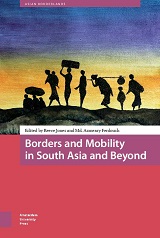 |
Borders and Mobility in South Asia and Beyond Asian Borderlands Series Amsterdam University Press Edited by Reece Jones and Md. Azmeary Ferdoush This book is open access and available to download for free |
Description:
The world is experiencing one of the largest movements of people in history with 65 million people in 2015 alone displaced by conflict, the majority of these coming from Asia. This book offers a deep engagement with individuals whose lives were shaped by encounters with borders: by telling the stories of a poor Bangladeshi women who regularly crosses the India border to visit family, Muslims from India living in Gulf countries for work, and the traumatic journey of a young Afghan man as he sets off on foot towards Germany. The international and interdisciplinary work in this book analyses how mobility and diaspora are engaged in literature and media and how the lives of migrants are transformed during their journey to new homes in South Asia, the Middle East, North America, and Europe, coalescing in a timely portrait of migrancy and undesired mobility.
Contributors: Edward Boyle, Mirza Zulfiqur Rahman, Azizul Rasel, Kavitha Rajagopalan, Ananya Chakraborty, Andrea Wright, James Weir, Rohullah Amin, Marta Zorko, Malini Sur, Masja Van Meeteren, Riddhi Shah, Tana Trivedi
Reviews:
'relevant,' 'thought provoking,' and 'a good read.' - Diotima Chattoraj in Journal of Contemporary Asia
'This exciting volume brings together a new generation of thinkers, scholars, and activists to interrogate borders, bordering, and mobility in South Asia. In doing so, it makes a major intervention in ongoing debates that resonate far beyond the region.' - Jason Cons, author of Sensitive Space: Fragmented Territory at the India-Bangladesh Border
'An extraordinarily timely collection of essays to remind us of the crucial place of South Asia in twenty-first century displacements, and the urgent need to theorize its new border regimes through the ordinary and catastrophic experiences of moving people.' - Vazira Zamindar, Associate Professor of History, Brown University